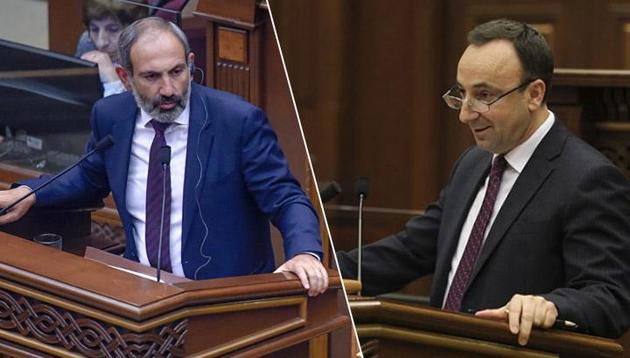A referendum on changing one article of the constitution is scheduled for April 5 in Armenia. Authorities insist on the need for early termination of powers of seven of the nine members of the Constitutional Court (CC), including its chairman Hrayr Tovmasyan, who is identified with the structures of the previous regime. Almost the entire political elite of the republic, with the exception of the ruling bloc "My Step" and the ex-president of Armenia Levon Ter-Petrosyan, refrains from participating in this process, identifying it as legally vulnerable.
But weak domestic political support is not the only problem of the ideological inspirer of the referendum, Prime Minister Nikol Pashinyan. A number of European political structures explicitly allude to unacceptable "legal abuses" in connection with the referendum. The Parliamentary Assembly of the Council of Europe drew attention to the fact that the proposed changes may have long-term consequences for the functioning of the constitutional institutions of the republic, since such issues are resolved, as a rule, without referenda.
In turn, the head of the Venice Commission (expert body of the Council of Europe on constitutional law) Gianni Buquicchio drew attention to the fact that campaigning and elaboration of the referendum procedure were carried out against the backdrop of an open conflict between the government and the Constitutional Court of Armenia. Accordingly, European structures are concerned that under the pretext of reforming the judicial system of the republic, the current regime seeks to implement a constitutional coup, having previously legitimized it as much as possible.
The timeline of the confrontation between Pashinyan and the judges of the Constitutional Court is rich in unfinished processes. In October 2019, the Armenian parliament, on the initiative of the ruling faction "My Step" in an appeal to the Constitutional Court, announced the need to terminate the powers of its chairman. The Constitutional Court refused the National Assembly, stating that the resignation procedure does not comply with the regulations, according to which the chairman of the court Hrayr Tovmasyan would resign. Leaving the implementation of his initiative halfway, the ruling party hastily drafted a law on the early retirement of judges of the Constitutional Court, thereby forcing Tovmasyan to voluntarily leave the Constitutional Court. He did not leave.
Considering the second attempt to “remove” Tovmasyan from the Armenian policy to be unsuccessful, Pashinyan and his team again left the implementation of the plan halfway, resorting at least to the criminal prosecution of Tovmasyan.
At the end of December 2019, Hrayr Tovmasyan was charged with “abuse of power,” which the current chairman of the Constitutional Court was ready to challenge in European arbitration. A lengthy trial at the ECHR, for which Pashinyan clearly did not expect a positive outcome, significantly cooled the ardor of the ruling party, but did not prompt him to abandon his plan. Now Pashinyan is trying to resolve the issue through a referendum, the legality of which is being questioned.
In international practice, there are standards and principles through which political power cannot influence the judicial system. In all modern democracies, the highest judicial bodies are considered a deterrent in the system of separation of powers, which does not allow political forces that come to power to apply the laws of the country in their political interests.
Now in Armenia there is an attempt to “restore order” in the Constitutional Court of the republic, camouflaged by checking the degree of public trust in the judicial system. This can lead to an excessive concentration of power in the hands of one person, and Pashinyan risks being accused of usurping power.
It is not known whether the prime minister will have enough political resources to neutralize the negative consequences of the referendum. However, most likely, it will only lose, even if it manages to get the desired outcome of the will. The referendum will go down in the modern history of Armenia as one of the most controversial decisions of the “People’s Prime Minister” and will always cause criticism from the point of view of legitimacy. In the end, the judges of the Constitutional Court can always apply for the restoration of their rights to the European Court of Human Rights. And if the ECHR takes their side, then the results of the referendum and its very expensive conduct can be considered meaningless.






